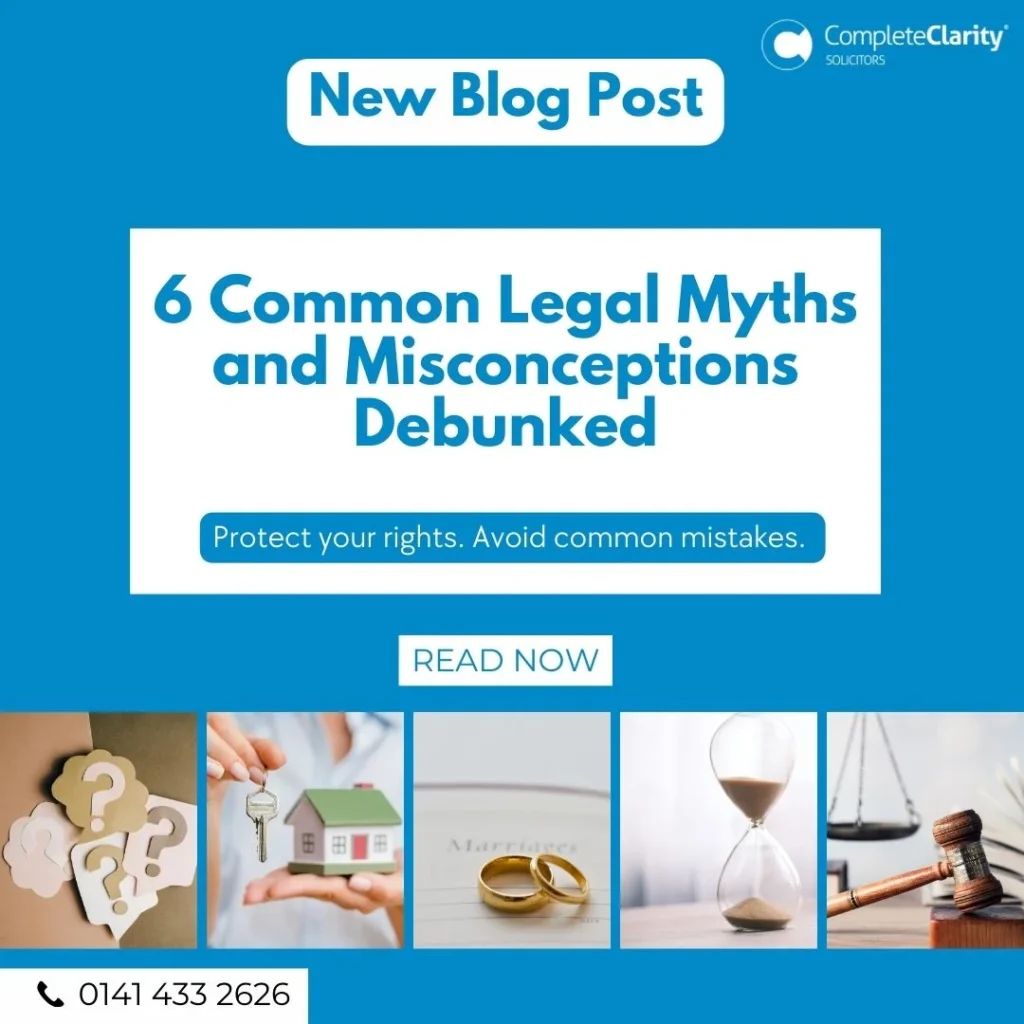Common Legal Myths and Misconceptions Debunked by Scottish Law Solicitors

By Kirsty Westbury, Legal Assistant
As a fourth-year Scots Law student at the University of Glasgow, preparing to start my Diploma in Professional Legal Practice and working as a legal assistant at Complete Clarity and Simplicity Legal, I regularly come across legal myths and misconceptions that cause confusion and, at times, lead to decisions that result in unnecessary stress or costs.
Whether it’s family law, conveyancing matters, employment disputes or personal injury claims, many people rely on advice from friends, family, or the internet. Unfortunately, this advice is often inaccurate. In this blog, I’ll highlight some of the most common legal misconceptions we encounter at Complete Clarity and Simplicity Legal and explain the reality behind them, helping you better understand your rights and obligations.
⚖️ Myth 1 - Cohabitation: "If we live together, we’re 'common law married' and have the same rights as married couples."
Reality:
There is no such thing as “common law marriage” in Scotland. Even if you’ve lived together for many years, you don’t automatically have the same legal rights as a married couple. However, under the Family Law (Scotland) Act 2006, cohabitants do have limited rights, particularly around financial claims if the relationship ends, but these rights are much narrower than those of spouses or civil partners.
🏢 Myth 2: "I can’t be made redundant if I’ve been in my job for a long time."
Reality:
Length of service alone does not protect you from redundancy. In Scotland, as long as the redundancy process is handled fairly and legally, an employer can make employees redundant regardless of how long they have been employed. However, employees with at least two years of continuous service are entitled to statutory redundancy pay, provided they meet other eligibility requirements. Employers must follow a fair process, including consultation and consideration of alternative roles.
📜 Myth 3: "If I don’t have a will, everything automatically goes to my spouse or children."
Reality:
Without a will, your estate will be distributed according to Scotland’s rules of intestacy, and the outcome may not reflect your wishes. While spouses, civil partners and children do have certain prior rights and legal shares, other relatives may also have claims. Cohabitants, in particular, may not have the protections they expect. Having a valid will ensures that your wishes are followed, and clarity is maintained.
💼 Myth 4: "Verbal agreements aren’t legally binding in Scottish Law."
Reality:
Verbal agreements can be legally binding in Scotland, provided they meet specific legal requirements (such as offer, acceptance and the intention to create legal relations). However, they are often difficult to prove if a dispute arises. For important matters, it’s always best to put agreements in writing.
📅 Myth 5: "There’s no rush — I can bring a legal claim whenever I want."
Reality:
Most legal claims are subject to strict time limits, known as “limitation or prescription periods.” For instance, personal injury claims must typically be raised within three years and certain contract or debt claims within five years. Missing a deadline could mean losing the right to claim altogether. It’s essential to seek legal advice as early as possible.
👶 Myth 6: "I’m a grandparent. I have the right to see my grandchild, even if my daughter’s new husband doesn’t like me."
Reality:
This is a common misconception. No one, not even a parent, has automatic rights to contact with a child in Scottish courts if there is a dispute. The court’s primary focus will be the child’s welfare, not what the grandparents may feel entitled to. While grandparents don’t have automatic rights, they can petition the court for contact if it’s in the best interests of the child. It’s always better to try discussion and negotiation first, but if you believe contact is vital for the child’s well-being, the court can intervene. The process can be challenging and it’s crucial to consider what is in the child’s best interest.
📞 Final Thoughts - Solicitors in Scotland Are Here to Help
Legal misunderstandings can have serious consequences — from missed deadlines to lost rights or unnecessary disputes. If you’re unsure about your legal position or need advice tailored to your situation, it’s always best to consult an experienced solicitor for peace of mind.
At Complete Clarity and Simplicity Legal, our team is here to provide clear, expert advice designed to meet your needs and help you make informed decisions.
Contact us today at 0141 433 2626 to speak with one of our experts.
Why Choose Complete Clarity Solicitors?
Find out about our process and how we charge
Related Posts

Children’s Voices in Scottish Family Proceedings
Children’s Voices in Scottish Family Proceedings In family proceedings, the Courts bear the responsibility of making decisions which they believe

Ending a Tenancy in Scotland: The Legal Process for Landlords and Tenants
Ending a Tenancy in Scotland: The Legal Process for Landlords and Tenants Ending a tenancy in Scotland requires strict compliance
"(Please Confirm)" indicates required fields
Contact us today
Please note: We do not offer legal aid


